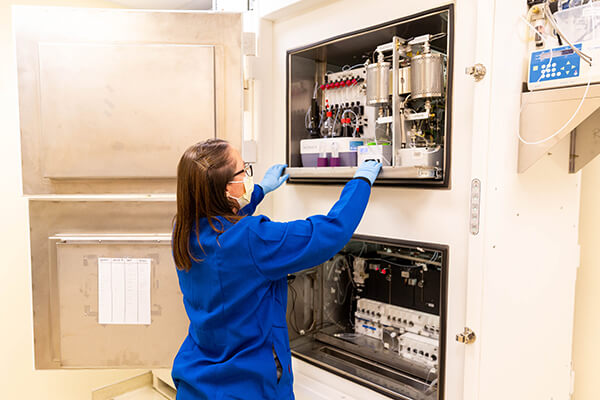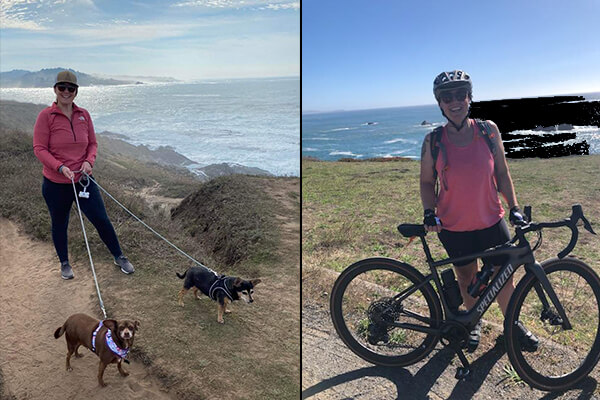Robin Ippisch, PhD Spotlight

December 21, 2022
Robin Ippisch, PhD is the Director of the UCSF Radiopharmaceutical Facility, which houses the cyclotron. Dr. Ippisch has led the cyclotron facility and its multidisciplinary team of chemists, engineers, and technologists since July 2020, first as an interim appointment before being confirmed as director in March 2021. There she and her team perform the full manufacturing process to produce the radiopharmaceutical drugs administered to UCSF Health patients within the same day.

Robin earned her BS in Chemistry at Mills College of Oakland where she was first exposed to the idea of nuclear medicine. It was only a small subsection in her nuclear chemistry course, but as someone who enjoys the tactile and mechanical side of learning, Robin was delighted by a discipline that combined chemistry and hands-on engineering with machines in a way that could improve people’s lives in such an immediate way.
This new interest led Robin into a summer school program in nuclear and radiochemistry where she had the good fortune to meet Henry VanBrocklin, PhD, Director of the Radiopharmaceutical Research Program in the Center for Molecular and Functional Imaging at UCSF. Dr. VanBrocklin was professor of the week in nuclear medicine, and Robin got the chance to sit by him at the end-of-week dinner. From that connection, Robin asked Dr. VanBrocklin if he would take her on as an intern in his lab at UCSF, which he did in 2008.
As a young woman starting her PhD, Robin found that radiochemistry is still a very male-dominated field. However, Robin was fortunate to find, as her dissertation supervisor, Julie Sutcliffe, PhD, Director of the Cyclotron and Radiochemistry Facility and the Center for Molecular and Genomic Imaging at UC Davis.
Robin recalled, “My own experience is in part why I have always been passionate about advocating for more young women coming into radiopharmaceuticals and radiochemistry. We need to bring women up and make the field a lot more diverse. We need to have a diverse set of mentors that people can look to and know that they can succeed in this field as well.”
Prior to her current position, Robin worked as a research scientist at Avid Radiopharmaceuticals. She also previously served as a postdoctoral researcher and radiochemistry associate at Avid and was a staff research associate at UCSF.
Now, as director of the team running the Radiopharmaceutical Facility, Robin has devoted herself to the recruitment and construction of a dynamic group at China Basin. It is a very fast-paced lab, but Robin takes care to foster an environment where everyone can communicate clearly, and one that allows people to share duties in a way that provides the support each person needs.
“In our work, it's important to me that the team gets along, that we support each other, and that we allow every person to play to their own strengths,” Robin observed. “In order to thrive in your career, you need to always remember why you are doing what you’re doing. I focus on the purpose of what we’re doing and why I love the field. On our team, we foster career growth with opportunities for individual development and chosen projects. The team mentality is so important for us to quickly get drugs to the clinic for patient care.”
Robin is most proud of how the radiopharmaceutical facility contributes to patient diagnosis and treatment along with facilitating new research and often enabling the first-in-human studies. “At UCSF, there are faculty who have worked on a certain compound for decades. Then the RPF team gets to help enable that very last step to allow their work to reach a human clinical trial for the first time. The facility in China Basin provides a great benefit to many researchers and clinicians, yet people are often surprised to learn that we are registered with the FDA as a commercial drug manufacturer.”
The lab does everything from start to finish for each patient. The particle accelerator produces the radioactivity, then the team produces the drug using those elements, and analyzes it for quality control. This entire process can be as quick as 90 minutes, a necessity for substances with a short half-life. Once made the drugs only last for four to 24 hours. This means that every moment counts, so these products are shipped around China Basin through a special system of pneumatic tubes for lightning-fast response times. This does also mean that, sometimes, you might see members of the team running through the clinic when the pneumatic tube system goes down.

Outside of work, Robin is an outdoors lover and always eager to snowboard, wakeboard, or go hiking and camping. On some of these hikes she is joined by her two rescue dogs, Mijo and Greta. Robin has always been a very physical person, and in fact advanced to a very high rank as a nationally competitive gymnast up through high school. In college, she split up her high school water polo experience into becoming a dual sport collegiate athlete on both the volleyball and swimming teams while earning her chemistry degree.
“Gymnastics was a big part of my life. I feel that a lot of my work ethic and outlook on life came from that experience as a competitive gymnast. It required a lot of dedication and a lot of fighting through pain, and that motivation has helped me since.”
A gracious host in her cyclotron domain, Dr. Ippisch invites anyone in the Department of Radiology and Biomedical Imaging to visit the radiopharmaceutical facility in China Basin and see the remarkable machines which make possible so much research and patient care. You may email Robin and she would be happy to provide a tour and to share the work her team has accomplished.
